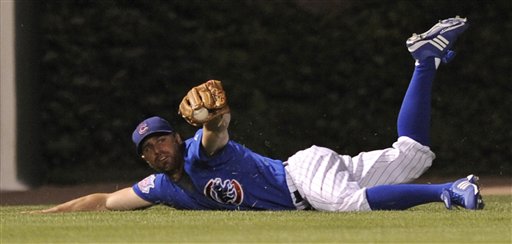Just a few days after the Yankees brought Randy Winn aboard the Dodgers struck by signing Reed Johnson, who was also in consideration for the left field spot in the Bronx at some point as well. When the deal was first reported, I said it would be interesting to see how much money Johnson got compared to Winn, who was the recipient of the Yankees’ last $2M. As it turns out, the Dodgers landed Johnson for just $800,000, which makes the Winn contract look just awful.
It’s not that Winn is overpaid compared to the value he provides, in fact if he’s just a one win player in 2010 (something he’s been in every single one of his full seasons in the bigs) then the Yankees are getting a slight bargain. However with the market like it is and compared to his peers like Johnson, Winn is overpaid. Obviously there’s a lot more going on here than just what appears on the surface, and we have no idea what went on behind the scenes. Winn was reportedly ready to accept another offer (from the Nationals) and he certainly leveraged that against the Yanks, and Johnson may have taken a bit of a discount to go back to Southern California, where he grew up. We have no idea how (or if) those factors came into play.
But getting back to the players, the idea was that the Yanks were looking to bring in a righty hitting outfielder to platoon with Brett Gardner, and Johnson seemed perfect for the role. He’s a career .313-.378-.463 hitter against southpaws, compared to Winn who’s hit .280-.332-.426 off lefties in his career and just .158-.184-.200 against them in 2009. There’s just no disputing that Johnson was a far better fit for that role, however the game doesn’t end in the batter’s box.
Just looking at the players the Yankees have vying for bench spots – Winn, Ramiro Pena, Jamie Hoffmann, Greg Golson, Frankie Cervelli – it’s easy to see that the team is emphasizing defensive competence with their reserves. Johnson’s defense has been a mixed bag, as he’s posted an above average +5.4 UZR in 106 defensive games in left over the last three seasons, so it’s a nice number in a not large sample. Most of his recent action has come in center (just 21 games in right over the last three seasons), where he’s posted a -6.0 UZR in 121 defensive games. We’ve already discussed the fact that Winn is one of the best defensive corner outfielders (and best baserunners) in the game here, so the run prevention smiley face goes on Winn’s paper.
The prevailing thought is that the Yankees are susceptible to lefty relievers in the late innings with the likes of Curtis Granderson and Gardner hitting towards the bottom of the lineup, and that’s certainly true, but it’s not like Johnson has set the world on fire as a pinch hitter. In 90 career pinch hitting appearances, he’s a .238-.303-.375 hitter, and if we’re going to trash Winn for 125 at-bats vs. lefties in 2009, it would be hypocritical to not denounce Johnson for his small sample size shortcomings. And the Yankees aren’t a team that pinch hits all that much anyway (97 total pinch hitting appearances in 2009, most of which came when they were resting players in September), so we’re talking about a situation that might pop up once or twice a week.
Yes, giving Randy Winn $2M next season is drastically overpaying considering to how the market shook out, however we’re talking about a spare outfielder and the 23rd or 24th man on the roster. Overpaying that guy for one season isn’t a big deal, especially for the Yanks. Johnson is a nice player, but as fans we tend to focus on just one aspect of a player’s game and trick ourselves into thinking they’re more (or less) than they really are, and that seems to have definitely happened with these two players given their production against lefthanders. CHONE projects Winn for 0.8 WAR in 2010, Johnson got a whopping 0.1 WAR. Sure, Reed Johnson hits lefties well, but Randy Winn does everything else better. The price is definitely wrong, but the player is right.
Photo Credit: Paul Beaty, AP

Leave a Reply
You must be logged in to post a comment.